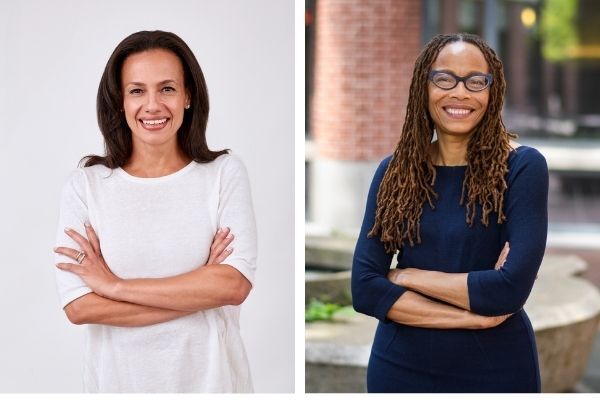What does reproductive justice have to do with anti-racism? This question was addressed by PIK Professor Dorothy Roberts during the 21st annual Reverend Dr. Martin Luther King Jr. Lecture in Social Justice in conversation with Planned Parenthood’s Alexis McGill Johnson. Yet far from being “a white woman’s issue,” as Roberts said she was once told, reproductive justice is intersectional, with the most vulnerable populations experiencing an increased likelihood of poverty and unemployment after being denied an abortion. “Racism and white supremacy have always been at the heart of assault on reproductive freedom,” Roberts said during the Jan. 25 conversation, co-hosted by the Center for Africana Studies and the Annenberg School for Communication and co-sponsored by the Black Alumni Society.
The event was introduced by President Amy Gutmann, Interim Provost Beth Winkelstein, and John L. Jackson Jr., the Walter H. Annenberg Dean of the Annenberg School for Communication.
When Martin Luther King was asked how health care fit into his message on social justice, Gutmann said, his response was, “Of all the forms of inequality, injustice in health is the most shocking and the most inhuman because it often results in physical death.”
While Roe v. Wade was decided almost 50 years ago, increasing impediments have made abortion access difficult for many women, McGill Johnson said. With 26 states—mostly in the South and Midwest—likely to ban abortion, it’s no longer a matter of if but when Roe is either gutted or overturned, McGill Johnson said. “We have never been closer to losing such a fundamental constitutional right.”
McGill Johnson called this “a tyranny of the minority.” There is no state in which banning or restricting abortion is popular, she said. “The majority of people believe that we should have access to abortion under Roe.” Nevertheless, the anti-abortion movement has been extremely effective in weaponizing each of those premises under which the right to abortion is held and designed legislation that has been taken up in state houses across the country, she said.
“I am always shocked by the idea that you have a constitutional right” to have an abortion, said Roberts, “but states are allowed to do whatever they want to create burdens to you exercising your right as long as it’s not undue.”
Roberts added that the new Texas law S.B. 8 is particularly concerning, as it gives individuals the power to report people they suspect have had an abortion. “It adds a whole layer of this intense kind of surveillance by the state,” said Roberts, with “reverberations beyond the decision to terminate a pregnancy that affects the nature of our relationships with each other and the government. These are really widespread effects.”
The incentive is a bounty of $10,000 per abortion, McGill Johnson said, and the same person can be sued by multiple people. “I can think of former friends and family members who would be incentivized by sharing private information,” she said. “Are you tracking down what’s happening after a miscarriage?” she asked. “How is that not a complete invasion of privacy?”
Black women in particular are more likely to be reported based on suspicions, Roberts said, “so that’s another layer to this that adds to the dangerous situation we’re in.”
At the same time that politicians are forcing people to continue pregnancies, which can result in debt and poverty, they are also enacting voting restrictions and trying to “gerrymander us out of representation,” said McGill Johnson. “I hate to say it, but it’s like the 21st century version of the three-fifths compromise. It’s like our bodies count when they need to shape a political map, but they are silencing our voices when we need to be vocal.”
There is a “particular demonization around Black women’s decision-making about what we do and how we claim ownership over our bodies,” McGill Johnson said. “It’s about shaming, so they can introduce the stigma and insinuate—essentially at our core—that we can’t make our own decisions and that we shouldn’t be trusted.”
Looking at the lack of health care and economic infrastructure in the United States to support healthy deliveries and child rearing, these policies criminalize not only abortion, miscarriage, and pregnancy but also maternity, McGill Johnson said.
“This is a confluence of not only political policies that are based in white supremacy,” Roberts said, “rooted in an ideology of white supremacy about who deserves to have human rights, who deserves to be treated like an equal human being.”
To conclude, Roberts asked McGill Johnson how Planned Parenthood was reimagining its role and what strategies she proposed in the current legal and political landscape.
The Women’s Health Protection Act will help address the issue by allowing Congress to review the abortion bans to see whether or not they are compliant with the constitution, McGill Johnson said. In addition, the Biden administration lifted restrictions on medical abortion, “which I think was a huge step forward,” she said.
“But the reality is the fight is going to go state by state now,” McGill Johnson said.
Planned Parenthood’s 20-year plan is “to bet on ourselves,” she said, to bet that the organization will be able secure reproductive justice as a right “that will sustain and remain.”
McGill Johnson said, “I think that’s the same bet that we need to make around our democracy.” She said, that, “in order to make the Constitution real, we need to actually center the right voices who have never really been included in the conversation.”
The biggest barriers right now are “apathy and exhaustion,” McGill said. “We’ve been fighting this fight for a very, very long time.”
Alexis McGill Johnson is the president and CEO of Planned Parenthood Federation of America and the Planned Parenthood Action Fund.
Dorothy Roberts is the George A. Weiss University Professor of Law and Sociology, the Raymond Pace and Sadie Tanner Mossell Alexander Professor of Civil Rights, and Professor of Africana Studies.








